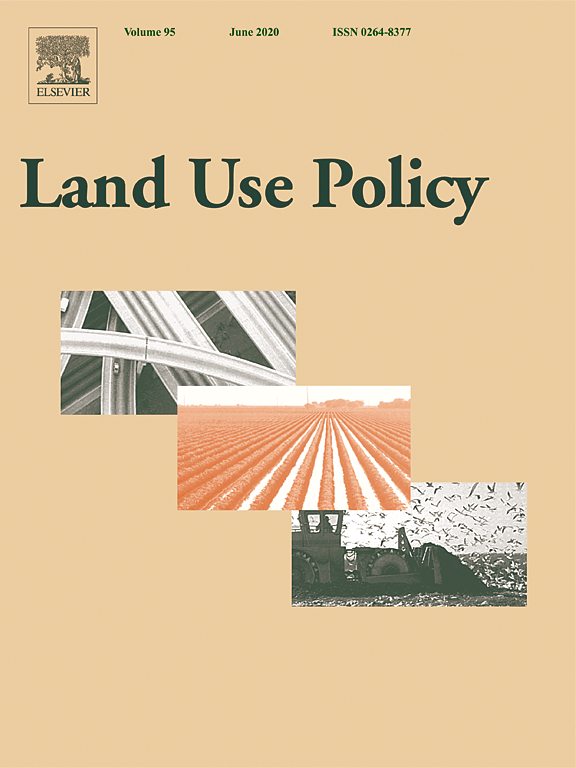Location
Land Use Policy is an international and interdisciplinary journal concerned with the social, economic, political, legal, physical and planning aspects of urban and rural land use. It provides a forum for the exchange of ideas and information from the diverse range of disciplines and interest groups which must be combined to formulate effective land use policies. The journal examines issues in geography, agriculture, forestry, irrigation, environmental conservation, housing, urban development and transport in both developed and developing countries through major refereed articles and shorter viewpoint pieces.
Land Use Policy aims to provide policy guidance to governments and planners and it is also a valuable teaching resource.
ISSN: 0264-8377
Members:
Resources
Displaying 76 - 80 of 279Learning through practice? Learning from the REDD+ demonstration project, Kalimantan Forests and Climate Partnership (KFCP) in Indonesia
Despite a growing recognition of the importance of social learning in governing and managing land use, the understanding and practice of learning has received limited attention from researchers. In global environmental programs and projects aimed at supporting sustainable land use in developing countries, learning is often promoted but without explicit learning goals. The focus may be on capacity building and community participation, and on testing policy tools, rather than on collaborative social learning.
Solving Brazil's land use puzzle: Increasing production and slowing Amazon deforestation
Brazil has become an agricultural powerhouse, producing roughly 30 % of the world’s soy and 15 % of its beef by 2013 – yet historically much of that growth has come at the expense of its native ecosystems. Since 1985, pastures and croplands have replaced nearly 65 Mha of forests and savannas in the legal Amazon. A growing body of work suggests that this paradigm of horizontal expansion of agriculture over ecosystems is outdated and brings negative social and environmental outcomes.
Customer-oriented approach in cadastral procedures – Case study from Finland
This paper is presenting research on with possibilities and benefit of applying a customer-oriented approach in public cadastral procedures. Public service providers have raised awareness towards customer-oriented approaches in their procedures during recent decades. This study discusses the relevance of adopting a new approach in cadastral procedures by presenting a new method to obtain a subdivision procedure. This is done by conducting a literature review followed by a description of this new method in Finnish local government, the city of Tampere.
Economic and financial sustainability of an Acacia decurrens-based Taungya system for farmers in the Upper Blue Nile Basin, Ethiopia
The use of tree-based fallowing as a sustainable land management system may serve as an important developmental pathway out of poverty across drought-prone watersheds in the Upper Blue Nile Basin, Ethiopia. This study employs a financial analysis technique, the computation of net present values, to explore the financial viability of farmers’ investments in an intercropping farming system known as taungya. The analysis employs scenarios that include different farming systems, such as A. decurrens (J.C. Wendl.) Willd. cum teff (Eragrostis tef) intercropping, A.
Working on the boundaries—How do science use and interpret the nature-based solution concept?
Nature-based solutions (NBS) is the latest contribution to the green concept family. NBS is defined as actions based in nature addressing societal challenges. In this study, we lean on the concept boundary object, broken down into three analytical categories: use, core ideas and granularities, to explore the cohesive and fragmenting powers of the NBS concept, and discuss its future role in green space governance. The study is based on a structured, qualitative review of 112 scientific peer-reviewed publications that use the term NBS.




